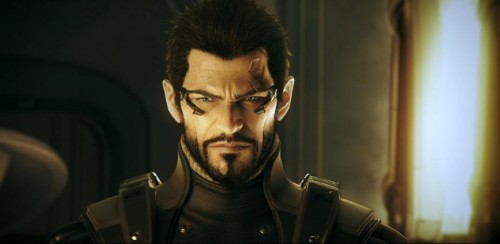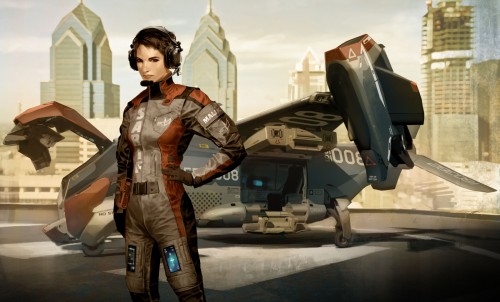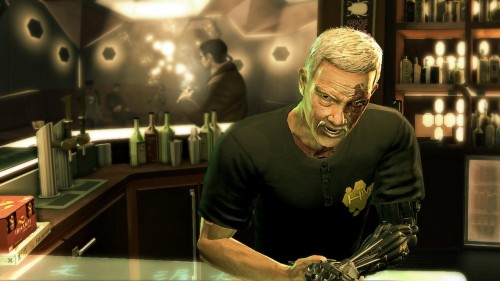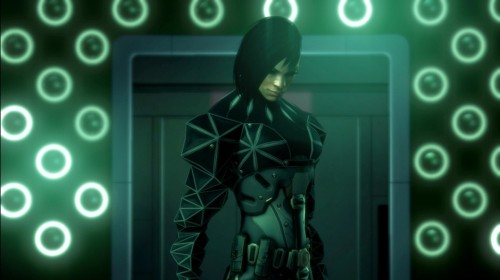
I’m a cyberpunk and proud of it, even though I’ve always been the outsider in every single subculture I’ve managed to disrupt. I’ve grown up with Neuromancer, wrote my MA diploma in postmodern cyberpunk SF and I’ve always worked along the neon-coloured cultural gridlines that made people aware of biotech, the fusion of man and machine and all that stuff. I’m sinking my teeth into anything cyberpunkish with sweet agony and pulsing organs. Deus Ex: Human Revolution left me with broken canines and burst tear ducts with seeping coolant the color of Cherenkov sadness.
I’ve spent long days playing the press copy I’ve gotten from PlayOn Hungary to see the game others heralded as the best game of 2011 and the latest and greatest in cyberpunk. Verdict, it’s tragically mediocre, a one-night stand gone stale, an equivalent of a fuck turned so boring you decided to watch TV and set up shopping lists inside your head while getting something of a blowjob simile. Don’t get me wrong, it’s got great aspects to it. In fact, it’s got amazing aspects to it. But at the end of the day, it’s just another game in the long line of high concept low realization shooters by cyberpunk wannabes. Or maybe it was all very different in the design documents at first. Trust me, I don’t bulge with glee when I write this. (Watch out, a thousand spoilers inside!)
PLOTLINE/STORY/SETTING
PRO: It’s really cyberpunk. Afficionados have waited long and hard for games with implants, hacking, an Asian setting, self- and world-doubting AIs, thermoptic camouflage, designer drugs and Neoesque futuristic fashion. We’ve had glorious moments with Bloodnet, System Shock (great intro music here) or the earlier etapes of the Deus Ex universe but it’s been quite a while since anyone made a coherent universe with a plotline that spans the globe and makes you feel like a protagonist of a first-generation cyberpunk novel. (If you don’t know what a first-gen novel is, read the early stuff by Gibson, Sterling, Stephenson, Cadigan, Maddox or Shirley. Gonna give you some brain candy to chew on.) In fact, the dev guys made quite a number of hidden in-game references to the Mirrorshades authors. Instant binding power of understanding hidden “insider” references.
CON: And at the same time it’s a mishmash of clichés. Detroit, the far future. Good cop gets killed, wakes up as half human, half machine. Questions his identity. Goes after his murderers. Gets involved in a conspiracy, kills everyone he gets his hands on. Familiar? Of course, it’s the new Deus Ex. And it’s also Verhoeven’s movie Robocop. From 1987. (You might not yet have been a blink-worthy idea of your parents genitals. Get some perspective here.) Let’s get real, early cyberpunk literature was a quite well-defineable trend in terms of tropes and relevances and it’s sort of obvious that you’ll meet cyberpunk clichés in a cyberpunk game. (And not much else, for that matter.) You might even call all these wonderful in-game references, the invisibility camo of the Panther Moderns or Major Kusanagi, the global brainwashing pandemic of Snow Crash and the showdown right in the middle of the ocean, a global news network spearheaded by the AI of Max Headroom, a street food vendor in the rain from Blade Runner or an AIesque system with people hooked into it from Minority Report. These might even be cultural facets of novelty to you if you’re young. (Which is okay, do not go batshit over being pathetically inexperienced.) One reference that’s amazing though, is the Bladerunneresque moment of stepping into your flat and see how the rays of sun pierce through the emerging shades.

PRO: It’s not really cyberpunk. It’s actually transhumanism. Well, actually, no. Ghost in the Shell in 1995 and its sequel, Innocence in 2004 went waist-deep into bioethics and the role of AI/aug in society. As did a handful of other movies. But all the talks with Sarif, Darrow and Taggart echo today’s H+ forum discussions and magazine posts and you get to see different aspects of the whole augmentation technology on a global level. Not very bright or detailed but at least gives you a few good points to think about.
CON: Flat characters. And all the three characters are mentioned are antagonists, more or less involved with the Illuminati. And even then they’re not well-rounded and fleshed out characters. They’re not memorable, they’re not even characters, only roles with mouthpieces. My characters isn’t even vaguely shocked by the fact that his real parents are in fact his foster parents and he is the living template of the breakthrough in human evolution. And the Illuminati accelerates this research by stealing the scientist and trying to kill the living template in a thousand ways instead of kidnapping him as well? (This is actually not a flat character problem, but a glitch in the plotline. Just saying.)
CON: Did you really try to trick us with asking us to get an update at L.I.M.B.? Right. We are fighting a several thousand years-old conspiracy, the secret masters of the world and it suddently turns out everyone with augs is affected, undergoing trauma. And right in the middle of the biggest shitstorm we’re supposed to suddenly go to an aug clinic to get an update? If you’ve still got some sense in you, you don’t do that. (Turns out that we’re right.)
CON: Not a happy ending. Eliza gives you three possible endings – you choose what’s going to happen to the world as the sexiest AI of the past few years spreads different news throughout the globe. I managed to get to see two endings out of a reload (not all three) but ending up with sombre monologues about humanity, progress and change instead of really getting to know what happened to protagonists, antagonists and the world is simply not satisfactory. Did I get to screw anyone finally after putting my ass on the line against basically everyone?
IMMERSION/ATMOSPHERE
PRO: The soundtrack is by far the best thing in Deus Ex: Human Revolution. If you’re a fan of cyberpunk, you keep Vangelis’ Blade Runner soundtrack on your altar. It’s an urban moodsetter of UNFATHOMABLE ROCK and Michael McCann’s OST is actually on par with the Vangelis soundtrack. It’s going to give you goosebumps, great analogue basslines, one great techno track (which is sort of obviously linked to a Hengsha brothel) and it’s also a dead giveaway for the ending – in the sense that it’s not gonna be a happy one. Which is another great fact in itself.
CON: Environment offers almost no immersion into the urban jungle. Walking the Sarif science labs. Few people, very sterile, poor textures, no immerson, I don’t feel like I belong. Sneaking in the Picus news network building that has been recently and quite conveniently evacuated. No people. Very sterile, poor textures, no immersion, I don’t feel like connected to this situation at all. I’m in Singapore, Melbourne, Detroit, Heng Sha, Panchaea. Bet you know what I’m about to say about all these places. I don’t see enough people in the slums, near public buildings, in parks, in the goddamn cities. There’s no interaction, there’s no real dirt, no real background noise. There is no life. I’m not walking cities, I’m walking in levels. (Never had that feeling in GTA:IV even though I couldn’t enter every single store.) I see the high tech, I don’t see the low life. It looks and feels like Hellgate:London to me. Apart from the above-mentioned Jensen flat in the Chiron building that gives you a sense of familiarity and good lighting works, Heng Sha streets had bicycles, urban background noise (with more bicycles) and a good amount of Cantonese talk. But hey, that is fucking China. You don’t have that few people on the streets, that’s a marker for life, not polygons that waste processing power.
CON: Terrible voice acting. Adam Jensen’s been transformed into a machine, he’s under the impression that his girlfriend’s gone for good, his whole existence is transformed into something surreal. This is all fine but that doesn’t completely justify him sounding like Christian Bale masturbating and panting into tin boxes. As for the other characters – they’re not sounding frustrated, devastated, angry, fucked up, megalomaniac, fanatic, happy or surprised. They just trying to. And it’s all very audible. You want to get a taste of good voice acting? Try Thief 1 or Max Payne.
GAMEPLAY
PRO: Combat is fun. Deus Ex offers you a generous mixture of stealth, hacking and gratuituous physical violence to handle a situation but after doing all of them, gunfight’s going to make you into a trigger monkey. Throwing an EMP grenade under a BigDog mech and watching its explosion taking care of nearby sec guys is fun. Taking care of FEMA guards from a building’s top floor with a silenced sniper rifle is gratifying. The well-implemented cover system and a minor micromanagement inventory handling makes violence real fun.
CON: Illusion of free choice. While the gunfight (or one-button close quarters combat) is fast, clean and satisfactory, it makes other viable options (stealth and hacking) less interesting and less immersive. You will most probably use a combination of all three paths, but.. and we’d just repeat ourselves over and over again from here.
CON: Boss fights. And the superiority of gunplay again shows itself during boss fights. However much you spend your hours keeping yourself in the shadows, getting precious Praxis to kill into stealth augs, you can’t avoid long and tedious boss fights. (During which you’ll undoubtedly see how unfleshed and draftlike the Zhao character is.) And yeah, long and tedious is somehow default for a boss fight, I had bigger kicks out of fighting security bots or finishing off Zhao’s bodyguards right after she locked herself up in the panic room. Avoiding Namir’s grenades and plasma rifle? Bulletraping innocent victims in the Hyron core? Come on.

PRO: Wordplay. The real bossfights really are about wordplay, discussing, arguing and manipulating people into giving you codes, not killing hostages (or themselves) or revealing precious information. This is all facilitated by a social enhancer augmentation (something you should get right at the beginning) that gives you a basic profile of the person you talk to, hints on how to talk to him and a splash of pheromones that most often give you a clean home run. Still, facial/gesture animation is surpisingly good in these scenes and after succesfully completing such a scene, you leave with a feeling of achievement. (Unlike boss fights.)
CON: Long loading times on Xbox360. It’s sort of okay to die twenty times during a boss fight (I’m not that used to FPS fights on consoles) but the loading times are extremely long and will most probably kill your mood, put you down and leave you whining like a broken dog. Might be overplaying this a bit. Still, too long.
CON: Sprint. Adam Jensen, protagonist, can jump 3 meters high, lift vending machines without breaking a sweat, survive short bursts of high voltage, regenerate health over a few seconds, able to carry several military-grade heavy weapons, get invisible, see through walls and still, can’t sprint for more than 3 seconds. You guys serious about this?
CON: No vanity mode. In a game with an imperative to continuously upgrade yourself through different body and brain augmentations, it would feel natural to have a visual feedback. If you’ve just woken up: you don’t look different after maxing your arm or leg augments, equipping yourself with a Typhoon explosive system or getting any new augmentations to your eyes or skin. That’s the moment when using augmentations (in a game which is a lot about augmentations) doesn’t feel real anymore. (Compare that with how well the dev guys solved upgrading your weapons. That looks slick, overviewable in an instant and makes the weapons way more solid than implants.)
CON: No drugs. First-gen cyberpunk is undoubtedly hot on brain-altering chemicals, nootropics and designer drugs. Yet the only altered states we can get into is either fizzing our augs with an EMP grenade or drinking a beer. I know we can buy augs that sneeze pheromones but we’re really missing this.
CON: Hacking. Hacking is extremely badly implemented in DE:HR. The hacking mini-game (designed to hack security terminals, laser panels, office computers and anything alike) is just like a childhood tower of cards game laced with Pacman on acid and a shivering hand. Nuke or hack nodes in a network of different cardinal points until either you reach the green orb or your time runs out. It’s easy to understand but it doesn’t give you any sense of success, achievement or thrill. And it’s even worse on Xbox360 than the PC, so you often lose life-saving seconds (and it also takes away from the nonexistent fun of hacking).

All in all? I give this 5 out of 10 and most of that is mostly because the soundtrack and the cliché-laden story. The potential is there, very much there but if you want a real good cyberpunk game, you’ll need a lot more than that to make a franchise really worth turning back to in 2011. Or hire me and see what I make out of your ideas.